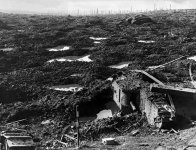bigwheelzip
Absent Comrade
Watching British and German news today (BBC & DW), and saw memorials to the 100th anniversary of a WWI battle whose name I was unfamiliar with, Passchendaele. Probably because US troops were not involved.
The campaign lasted about for about 3 months, and left more than a quarter million dead on each side.
Did you ever hear of this battle?
Before and after aerial photo. One ten-day barrage starting July 18th 1917, by 3000 artillery pieces used four million shells.

The campaign lasted about for about 3 months, and left more than a quarter million dead on each side.
Did you ever hear of this battle?
Before and after aerial photo. One ten-day barrage starting July 18th 1917, by 3000 artillery pieces used four million shells.

Last edited:

